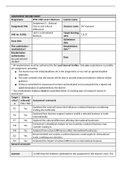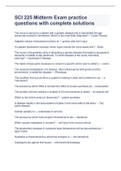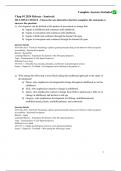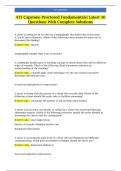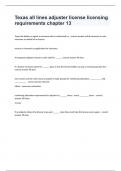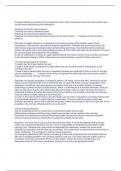Programme BTEC NQF Level 3 Business Learner name
Assignment 2 – External
Assignment title factors and cultural Assessor name Mr Munawar
differences
Unit 5: International Target learning
Unit no. & title C&D
Business aims
Submission
Issue date
date
First submission / Resubmission
resubmission? date**
Resubmission
authorisation
Date
by Lead Internal
Verifier*
* All resubmissions must be authorised by the Lead Internal Verifier. Only one resubmission is possible
per assignment, providing:
● The learner has met initial deadlines set in the assignment, or has met an agreed deadline
extension.
● The tutor considers that the learner will be able to provide improved evidence without further
guidance.
● Evidence submitted for assessment has been authenticated and accompanied by a signed and
dated declaration of authenticity by the learner.
**Any resubmission evidence must be submitted within 10 working days of receipt of results of
assessment.
Target Criteria
criteri achieved? Assessment comments
a (Yes / No)
Explained the external factors that influence a selected business considering
P5 Yes
trading internationally.
Explained how business support systems enable a selected business to trade
P6 Yes
internationally.
P7 Yes Explored the cultural differences affecting international businesses.
Carried out a situational analysis on two countries a selected business may
M3 Yes
consider trading in.
M4 Yes Analysed how cultural differences affect international businesses.
Recommended one country a selected business could target for international
D2 Yes
trade, justifying your decision.
D3 Yes Evaluated the impact of cultural differences on international business.
General comments
Assessor I certify that the evidence submitted for this assignment is the learner’s own. The
, learner has clearly referenced any sources used in the work. I understand that
declaration
false declaration is a form of malpractice.
Assessor signature Date
Learner comments
Learner signature Date
Unit 5 Assignment 2
My name is........., and I will be carrying out secondary research to analyse the external
factors and cultural differences in a business between two different countries. I will be
continuing my work at the local place of commerce. I will initially be writing about Tesco and
their external factor and cultural differences between my 2 contrasting countries, China and
USA. I will then choose one country that a business could target fort international trade and
is best suited for.
Analysis on two countries and their external factors
Tesco, which is a PLC, is a multinational business with roughly 7000 stores that sell groceries
and goods which headquarters in the United Kingdom. No other UK supermarket chain
operates abroad. Tesco has spread its activities beyond the United Kingdom, including China
and the United States, to 11 other countries around the world. China alone currently has
131 stores operating in their country and is currently planning to expand their store count
across the country. America has 175 stores currently operating in the country and as well as
china, are looking to increase their store count across the country.
A PESTLE analysis is used in a company and is a tool for analysing a company's industry in
which its in. The PESTLE analysis looks primarily at variables that are external to the
organization that will influence the business. it also helps to make decisions by providing
businesses with more insight into their business. Basically, pestle analysis gathers
information for each pestle category and then decides which PESTLE variables represent
market opportunities or risks. Pestle stands for:
Political
The political effect of the country's government has a huge influence on the manner in
which the country conducts its business. The extent to which a Government can influence
the economy, or a certain industry depends on the political factors. For example, a tariff on
,products may be imposed by a government which can change entire income-generating
structures of companies. The political system is essential to be understood in a country,
Vietnam and North Korea being Communist states, for instance, which means that trading
with both states is more difficult and potentially restrictive in comparison to other countries.
The import and export of products would be influenced by a policy that increases or
decreases the country's currency. That could have an effect on anything from a business
importing material to a company selling its services globally. The global pandemic, COVID-
19, is a significant political variable that currently shapes global corporations. This
influenced the currency already and will affect how we trade with other countries.
Economic
The economic conditions of a country in which they work are also impacting companies. The
economic conditions can have a significant impact on customers' willingness to buy goods
and also on business as a whole in that region. Economic factors which can have a major
impact on a country include:
Inflation
Interest rates
International exchange rates
Industry growth
Levels of taxation
Each of the above economic factors is likely to affect product or service demand, particularly
if the service or product is a premium product. Where tax levels, interest rates and inflation
are high, the cost of certain goods or services would be higher, and the demand will be
affected. Corporations need sufficient demand levels to ensure all their expenses are
covered. More revenue than expenses must be rendered to be a profitable multinational
corporation. This can also lead into demand and supply. The most important issue is
demand and supply. Demand is the consumer's desire to buy a company's products and
services. The supply, on the other hand, is the calculation of the demand for goods and
services made available to manufacturers or businesses. The market price of various goods
and services of an economy regulates demand and supply. If demand is higher than supply,
market prices will increase. When the stock price decreases, there is more supply than
demand. This is why the stability of market operations requires a moderate level of supply
and demand. As mentioned already the global pandemic, COVID-19, is a significant
economical variable that currently shapes global corporations. It has already affected the
growth of industries.
Social
Society is evolving constantly, with no uncertainty, tastes and fashions reflect this transition.
The rising popularity of social media is one of the most critical differences. The younger
generation tends to shop online using digital technologies whereas the elderly may stick to
, their traditional methods. There is also discussion of the impact of evolving society. these
evolving trends also impact companies, a business may have several different effects on
changes in social factors.
Social external influences on internal businesses vary depending on the country in which an
international business is operating. Social external influences can be very far reaching and
include everything from health factors in a particular country, for example levels of obesity
or smoking rates, we do other social factors such as attitudes to work and leisure, or the
make-up of the population such as the extent to which the population is aging or growing.
External social influences on businesses are affected by the general population of a country
and influenced by:
Lifestyle
Family size
Education level
Religion and beliefs
Average disposable income level
Population growth rate
Technological
Technology has a major impact on businesses. The ability to communicate fairly rapidly
increases through the use of the Internet, in particular online and social media. The
organization can really be affected by access to technical changes, particularly in connection
with international communications. In current history, the global availability of the Internet
has obviously grown. This creates an even bigger demand with many companies using the
Internet to connect with their customers. The improvement of globalization and
technological progress has made foreign business contact more efficient and rapid. It is easy
to connect through emails, text messages and telephone calls with international companies.
Technological advances have also enabled companies to determine how best their business
can be conducted and how they function more effectively. Competitors and other small
businesses will prosper unless the organization continues to improve their technology.
Legal and regulatory
Legal factors are external factors that impact the way corporations work and customers
participate. Law and regulations differ widely around the globe and countries in which
foreign corporations work. In order to protect the corporation, companies must obey
certain regulations enforced by a state and government. The country and its people are
protected by law from injustice and anarchy. Laws and regulatory system cover a broad
variety of different international business fields, including:
Employment law
Regulations about how businesses operate in the licence required.

